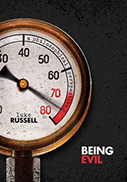Being Evil: A Philosophical Perspective

Author: Luke Russell
Publisher: Oxford University Press, 2020. 160 pages.
Reviewer: Penny Crofts ǀ January 2022
Being Evil, by moral philosopher Luke Russell, is an enjoyable and highly accessible frolic through philosophies of evil. Despite being only 35,000 words, Being Evil covers a great deal of philosophical territory. Russell provides an overview of many of the major philosophies of evil to arrive at his own secular definition.
In common with many philosophers of evil, Russell notes that there has been a resurgence of interest in the question of evil post–September 11. For example, in his 2002 State of the Union address, President George W. Bush drew upon a rhetoric of evil: “Evil is real, and it must be opposed.” Whilst the label of evil is associated with a great of deal of passion and provides a motive and justification for action, there is a lack of depth to the concept.
Russell sets himself the challenge of providing an account that “accurately describes the nature of evil actions, and allows us to see how they differ from actions that are not evil” (p. 24). The book considers definitions proposed by different theorists, details various strengths and weaknesses, and then adds complexity to those definitions. Russell uses practical examples of dictators, war criminals, criminals (especially serial killers), and fictional creations (including Lucifer) to tease out the implications of different definitions. Though Being Evil is not intended to provide a normative account of criminal law, the ideas that Russell considers can be usefully applied to tease out the models of culpability underlying and expressed in criminal law.
Russell aims to articulate the difference between evil and non-evil. This was also attempted by Claudia Card in The Atrocity Paradigm (2005), who criticised theorists such as Mary Midgley (1984) for failing to distinguish between the bad and the wicked. Arguably, criminal law does not need to distinguish between the bad and wicked—it is enough to have breached the law—but many theorists, including George Fletcher (2000), would argue that underlying those laws are patterns of blameworthiness. Russell explores whether the difference between evil and non-evil is qualitative and/or quantitative and ultimately settles for a quantitative definition revolving around extreme harms. This approach is consistent with George Fletcher’s pattern of harmful consequences and reflected in offences such as unlawful and dangerous act manslaughter and manslaughter by criminal negligence. It is the harm of causing death that is wrongful.
The first part of the book analyses theories arguing that evil is qualitatively different from non-evil. For example, Russell unpicks the argument that “an action is evil if and only if the motives from which it is performed cannot be identified” (40); that is, the idea that evil is incomprehensible. He points to Hannah Arendt’s argument in The Origins of Totalitarianism that the industrialised mass slaughter of the Holocaust revealed a “radical evil” that simply could not be explained by ordinary motives (1951: p. 459). Russell points out, as is commonly demonstrated in criminal actions, many motives may be awful or malicious but are not necessarily incomprehensible. Alternatively, motives may be comprehensible but are inadequate for the extremity of an accused’s actions. An alternative explanation is the idea that there is no evil without malice. But as Russell notes, we can have malice without evil, such as petty ill-will brought about by jealousy but resulting in little to no harm. Russell also notes that malice can exacerbate a wrong—a sentiment reflected in battery law—such that ordinary contact is converted into an offence. Russell asserts that malice can exacerbate a wrong, leading to a gratuitous excess.
The second part of the book focuses on quantitative definitions of evil. Russell notes that Arendt later disavowed her position that evil must be qualitatively different and incomprehensible; that is, that evil doers must be psychologically different—i.e., demons or monsters—from the rest of us. In Eichmann in Jerusalem, Arendt proposed the now famous idea of the banality of evil, pointing to the “strange interdependence of thoughtlessness and evil” (1963: p. 288). Russell argues that Arendt’s portrayal of Nazi SS officer Adolf Eichmann as thoughtless and lacking in malice is now thoroughly debunked, but believes that her ideas about the banality of evil are still insightful. Russell asserts that this approach has the advantage of emphasising that some evil actions come from ordinary motives and are performed by people who are not radical outliers. Russell provides a deep and thorough engagement with Arendt and the philosophers who have criticised her in a short, highly effective chapter.
Russell concludes by proposing a quantitative definition of evil:
[A]n action is evil if and only if it is a wrong that is extremely harmful for at least one individual victim, where the wrongdoer is fully culpable for that harm in its extremity, or it is an action that is appropriately connected to an actual or possible extreme harm of this kind, and the agent is fully culpable for that action (p. 86).
This is consistent with Claudia Card’s definition: “[E]vil actions are extreme culpable wrongs” (2005: p. 17). However, Card provides examples of harms, including domestic violence, which Russell might not be regard as extreme harms.
Russell argues that evil “must be extremely harmful for at least one individual victim,” not just minor harms inflicted on many victims (p. 83). He recognises that this assertion is contentious and actually undermines it on the following page with the argument that failed attempts to complete extreme harms are “just as worthy of condemnation, just as morally wrong, as many successful attempts” (p. 84). This approach is epitomised in Australian criminal law, which provides for equal penalties for failed attempts to commit crimes and completed offences. Here, the intention to commit the criminal act is key; all that is required is that the accused went beyond mere preparation. This argument shifts Russell away from harmful consequences to subjective culpability, where the focus is on the mental state of the wrongdoer, rather than the harm done.
The emphasis on extreme harms to at least one individual victim also points to another weakness in Being Evil: that this is an inadequate account of collective wrongdoing. What of minor wrongs to a large portion of a populace for the purpose of profit like, for example, pollution or the creation of highly addictive prescriptive drugs? This would not be ‘evil’ based on Russell’s definition, but could it be argued that the lack of care for humanity in the pursuit of profit is a form of evil? Like criminal law, much of the focus of Being Evil is on individual evil doers, and, like criminal law, the book fails to offer a good definition or explanation of collective evildoing. Russell could legitimately argue that this is not the focus of the book. But, given the litany of harms caused by large corporations and the relative dearth of any moral account or criminal legal attributions of culpability, this reflects and reinforces a failure that is an urgent problem in the 21st century.
In addition, whilst Russell provides ample coverage of many moral philosophers, Mary Midgley (1984) is a notable absence. In her book, Midgley argues that we need to shift away from the individualist account of intentional wrongdoing and instead focus on a classic account of wickedness as negative or lack. This idea of wickedness as a lack of balance, failure to do the right thing, failure to care, or an absence of goodness provides an explanation for many of the wrongs of the Holocaust and also of collective wrongdoing. Recent philosophical accounts emphasise that evil cannot be understood simply as the result of a few wicked and malevolent subjects. Instead, philosophers such as Simona Forti (2014) argue that we need to articulate an alternative genealogy about the relationship between evil and power, one that questions the recurrent hegemonic link between transgression, power, and death and that lets us see a paradigm of “mediocre demons” or “the normalcy of evil” (2014: p. 8). The focus here is not so much on malevolent subjects (like monsters), but on how we become compliant, meek subjects. These contemporary philosophical accounts depict the complicity of bystanders (including those in authority) who facilitate, fail to prevent, exacerbate, enable, turn away, or silence victims. These philosophies of evil highlight the need for criminal law to grapple with the failure of bystanders to intervene or prevent harm and the institutional failures that allow, condone, or facilitate harms.
In his conclusion, Russell notes that there may be no single account of evil. However, he argues that we need to
communicate clearly with one another when we evaluate extreme moral wrongs, and when we discuss how we ought to respond to these atrocious acts. When someone calls an action evil, it is very helpful to ask whether they mean to imply that it was influenced by a supernatural agent, or whether it was performed out of malice, or whether it was performed with sadistic pleasure, or whether it induces horror, or whether it is incomprehensible and so on. By asking these questions, we are better able to figure out exactly what we are disagreeing about, and what counts as common ground (p. 89).
We cannot opt out of making moral judgements altogether, nor should we. Criminal law is all about making moral and legal judgments. Criminal law communicates right from wrong, backed by legitimate sanctions of the state. Russell’s book is a good start to contributing to making our moral (and legal) judgments carefully from an informed perspective.
References
Arendt, Hannah. 1951. The Origins of Totalitarianism. New York, NY: Schocken Books.
Eichmann in Jerusalem: A Report on the Banality of Evil. New York, NY: Viking Press.
Card, Claudia. 2005. The Atrocity Paradigm: A Theory of Evil. Oxford, UK: Oxford University Press.
Fletcher, George P. 2000. Rethinking Criminal Law. Oxford, UK: Oxford University Press.
Forti, Simona. 2014. New Demons: Rethinking Power and Evil Today. Stanford, CA: Stanford University Press.
Midgley, Mary. 1984. Wickedness: A Philosophical Essay. London, UK: Routledge.
Penny Crofts, Professor, Faculty of Law, University of Technology Sydney. Professor Crofts has received a grant from the Australia Research Council to research Evil Corporations in Criminal Law, Horror, and Philosophy.


